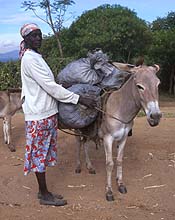|
Wheelbarrows and donkeys
for women in Makete, Tanzania
The Makete Integrated
Rural Transport Project operated for many years in a remote, hilly
area in south-west Tanzania. Women carried out most transport tasks
by head-loading. The Project suggested that wheelbarrows and pack
donkeys might be suitable intermediate means of transport. However,
the wooden wheelbarrows introduced were heavy, awkward and expensive.
Some men used wheelbarrows for construction work. Women considered
them heavy and unsuitable, particularly on the steep paths. The
local women pointed out to Project staff that two hands are needed
at all times when pushing wheelbarrows, and this is a disadvantage
when walking with small children. The wheelbarrows were never widely
adopted. The acceptance by men and women (mainly men) of donkeys
appeared higher but adoption was slow. Pack donkeys were useful
for men who transported potatoes from field to village and from
village to market. Some families used donkeys for water collection
and one woman used donkeys in a beer brewing business. Despite much
detailed transport research in Makete in Tanzania, most transport
is still carried out by women by head-loading.
|
|

Woman with
a pack donkey in Kenya. The donkey provides transport for domestic
use (especially the collection of water) and for trading (selling
charcoal)
|

